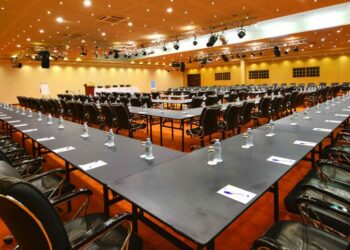I was intrigued when, a few weeks ago, I read an article in the Sunday Vision about a gentleman known as SK Mbuga, who is rapidly working his way through 23 billion shillings. Apparently he has bought many luxury vehicles, houses, built buildings and financed his huge extravagant wedding. I have always been fascinated by how some Ugandans spend their money on depreciating assets and lavish consumerism, often in the hope of gaining publicity.
In the case of Mbuga, and his new bride Chebot, it was reported that the source of their money was a scam his wife pulled off on a Swedish boyfriend. And it appears that they have made no attempt to hide the source of their wealth, so their story is printed all over the Ugandan newspapers.
It is therefore no surprise that the gentleman was arrested in Dubai and has been whisked to Stockholm to answer charges against him. I find it difficult to get my head around why someone would scam 23 billion shillings and then brag about it. I know that there are many people who would have no scruples about the scam, but most would then try to hide what they had done. Some Ugandans feel that they have to make visible, ostentatious displays of wealth, but did Mbuga not think that Interpol might be interested?
The story illustrates how some Ugandans crave publicity and recognition. We even have a culture in this poor country where people are referred to as ‘socialites’. These are usually those who turn up at events, spread some money around and court publicity, the sort of people who say, ‘do you know who I am?’
The story also illustrates how people invest in non-performing assets and consumerism that contribute practically nothing to the growth of a society. Importing an expensive car does nothing to grow our economy; building a flash house provides immediate employment for a few builders, but contributes little to economic growth. Holding a plush wedding is good for the beverage and catering companies, but otherwise doesn’t produce anything.
I was reminded of a conversation that I had with Afande Saleh, the head of Operation Wealth Creation, in which he bemoaned the fact that it is proving difficult to lift people out of poverty, and mentioned consumerism of imported goods as one factor that diverted money. Hence peasants stay in poverty, while those who have money tend to put it in assets and activities that do not create jobs or opportunities. And yet, even if we know the money that is being splashed around has come from a dubious source, most people are quick to join in approbation in the selfish desire to get a piece of the action.
Let me contrast this to the behavior of two other people I heard speak at the annual James Mulwana Business Symposium. Both are ladies: Dr Diana Nambatya, and Dr Agnes Apea. Dr Diana has a small farm on the outskirts of Kampala where she has raised chickens, sold eggs to the local supermarket, kept a couple of cows, built a biogas digester, produced organic fertilizer, grown strawberries and made strawberry jam, grown high value vegetables and started a training centre for women. She is getting great returns on investment from her urban farm, and is demonstrating what can be achieved for others to follow suit.
Dr Agnes returned to Uganda a few years ago and made the remarkable decision to move to her remote district in northern Uganda to earn a livelihood. She assessed the need and decided to start a rice farming cooperative for women. She started with twenty women, and now five years later has ten thousand women, all making a decent livelihood from growing rice under the cooperative.
These are four Ugandans: Chebot used her womanly wiles to scam 23 billion shillings, and her husband immediately blew that money, with practically no developmental impact on Uganda. The other two ladies had very little money: one had less than an acre of land, the other had some savings, but both of them have used what they had to carve out a good livelihood for themselves and, more importantly, bring development and increased wealth to thousands of other Ugandans.
It is interesting that oftentimes the quick money, obtained through scamming, hustling and thieving, doesn’t seem to bring anything, but if we take what we have – ourselves, our brains, our own hard work – we can build something. It may have small beginnings but will grow and last, and we will take pride in being part of developing Uganda.
Do you have a story in your community or an opinion to share with us: Email us at editorial@watchdoguganda.com









